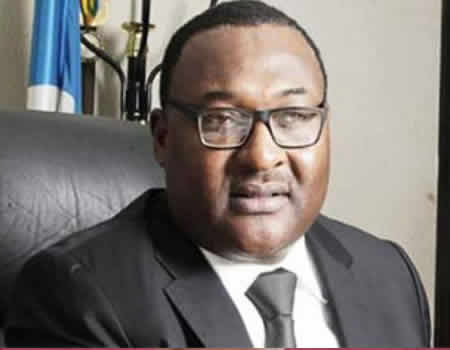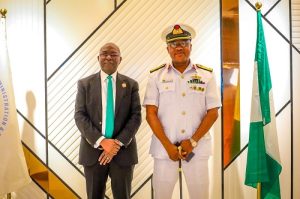Shippers’ Council Should Rank Ports Service Providers to Stimulate Efficiency, Competition, Says Hassan Bello

HASSAN BELLO
By Francis Ugwoke
The former Executive Secretary, Nigerian Shippers’ Council (NSC), Barr Hassan Bello, has recommended ranking of shipping service providers in the nation’s ports as a way of promoting increased efficiency and competition among the operators.
The assessment of the contributions of the service providers, Bello said, will help the blue economy contribute more to the GDP.
Describing the ranking as an international standard, Bello, who in a chat with SHIPPING DAY, explained that the ranking will be in terms of which of the terminals is faster in handling cargo delivery efficiently.
He further explained, “How can the blue economy in Nigeria help in reduction of cost of production by manufacturers? These are the things that tingle the economy, the tendency for us Nigerians, honestly is to have fanciness and in 10years time, you will ask what happened. Nothing moves.
“ Now, there must be assessment, there must be ranking, you have to measure something before you realize it’s utility value. How much will the blue economy, two years on, contribute to the GDP? So many things we leave without measuring.
“Look at the terminal operators, there’s no ranking and terminal operators are supposed to be ranked. There are international standards, if you take cargo to one of the terminals, Terminal A or Terminal B, which one is faster? Which one will have less paper work? And then, you rank them and you publish it.
“There’s no competition, that’s what is killing us. There’s competition in telecommunication, we use to buy the chips but now they beg you to use the chips and their services are getting competitive. The tariffs are also competitive”.
He said that as the ports economic regulator, it is the NSC that can effectively rank the service providers according to international index and World Bank Standard.
Bello said, “the regulator, the Shippers’ Council should rank because there are international index, the World Bank Standard Index about throughput, you will rank the port by its efficiency.
“That means crane movement, truck movement, the gate. You rank also by dwell time in that terminal, you rank with the technology, that means less interaction. We need a smart port and smart terminals, terminals that doesn’t have all the people there because things are done electronically, automatically easy and transparently.
“So, it is important we start ranking, there’s is less competition among the terminals. So, terminals must compete, if you rank, you see them now striving. The terminals have changed the way we do business. If you remember before the Sarunmi’s port reforms, it was very difficult but now they. have come and change the port.
“What happened with the port reform is that there’s a pause in port reform and once you pause, I gave example of dredging, you bring sand all over but then you put it in the bank, it will go back in. So, this is what happened to port reforms. There is a pause and that pause is very dangerous. We should continue with the speed of port reforms and the thing is, reduce the cost of transportation because cost of transportation is harming the economy”.
“Lack of modern infrastructure is hurting the economy and then we build the port just for port sake, like a constituency project. But what is the relationship between the port and the hinterlands? What about the interconnectivity? There’s none, we have to be very calculating, we have to be conscious of what’s happening. “When you build a port, you should be able to know the service you want to render. We have built the Lekki port, very important and the moment that Lekki port was built, our competitors were scared but how are we able to build a port without rail? Which means there’s already a problem. We have suffered in Apapa, then why do we repeat things? We should try now to have a multi-modal approach to that.
“The Blue Economy, as far as transportation is concerned, that is what they should link it with. Besides, there is also the dry Ports. The dry Ports at present are not really taken into consideration. A dry port is as good as a seaport because it’s a port of destination and a port of origin. Which means you can consign your goods there. This is the initiative of the Nigerian Shippers’ Council for a very long time. They have set up the Kano dry port is importing and exporting now but we need to concentrate on how we can reach the shippers, decongest the seaports and so on.
“One time, I suggested to the NPA and they took it, the cost in Calabar should not be the same cost as in Lagos and they did it and it was beautiful. So, my worry is over centralization of port administration. The Calabar, Port-Harcourt and what have you should have some autonomy because things are not the same but this unitary thing about the port is not helping. You have to incentivize the shippers who will nominate the port and it’s all done for economic reasons. If I come to your terminal and you said I should sign seventeen papers and if I go to the other terminal and they said no need, just stay in your house and I will bring you the cargo, which one will you prefer?”
“So, automation is key for efficiency and transparency. The port and transport system is infested with corruption, so, at any time, the revenue even expected are not the correct thing. Besides, we don’t have to continue to say port should bring the revenue, port should bring throughput and efficiency. We are not in the five ports in Africa, we are not in the 100 ports in the world, so, what are we doing?
“It’s good, even in appointing people as heads of agencies, I have seen that this has been done in NPA now. The guy who is there is NPA staff, so, you will expect that he knows his way and that is what is going to happen. I have seen his sentiments and they are good.
“The thing is competition among the terminals, if we don’t have competition, port reforms will cease and they will end abruptly. Then, if there’s no automation, transport will be dragged to the Informal sector and if that is done, that is disaster because everybody does his thing. The informal sector which called the grey economy has no regulations, no competition, no rules, no measurement. That means assessment report and guide to shippers”.
The former Executive Secretary, Nigerian Shippers’ Council (NSC), Barr Hassan Bello, has recommended ranking of shipping service providers in the nation’s ports as a way of promoting increased efficiency and competition among the operators.
The assessment of the contributions of the service providers, Bello said, will help the blue economy contribute more to the GDP.
Describing the ranking as an international standard, Bello, who in a chat with SHIPPING DAY, explained that the ranking will be in terms of which of the terminals is faster in handling cargo delivery efficiently.
He further explained, “How can the blue economy in Nigeria help in reduction of cost of production by manufacturers? These are the things that tingle the economy, the tendency for us Nigerians, honestly is to have fanciness and in 10years time, you will ask what happened. Nothing moves.
“ Now, there must be assessment, there must be ranking, you have to measure something before you realize it’s utility value. How much will the blue economy, two years on, contribute to the GDP? So many things we leave without measuring.
“Look at the terminal operators, there’s no ranking and terminal operators are supposed to be ranked. There are international standards, if you take cargo to one of the terminals, Terminal A or Terminal B, which one is faster? Which one will have less paper work? And then, you rank them and you publish it.
“There’s no competition, that’s what is killing us. There’s competition in telecommunication, we use to buy the chips but now they beg you to use the chips and their services are getting competitive. The tariffs are also competitive”.
He said that as the ports economic regulator, it is the NSC that can effectively rank the service providers according to international index and World Bank Standard.
Bello said, “the regulator, the Shippers’ Council should rank because there are international index, the World Bank Standard Index about throughput, you will rank the port by its efficiency.
“That means crane movement, truck movement, the gate. You rank also by dwell time in that terminal, you rank with the technology, that means less interaction. We need a smart port and smart terminals, terminals that doesn’t have all the people there because things are done electronically, automatically easy and transparently.
“So, it is important we start ranking, there’s is less competition among the terminals. So, terminals must compete, if you rank, you see them now striving. The terminals have changed the way we do business. If you remember before the Sarunmi’s port reforms, it was very difficult but now they. have come and change the port.
“What happened with the port reform is that there’s a pause in port reform and once you pause, I gave example of dredging, you bring sand all over but then you put it in the bank, it will go back in. So, this is what happened to port reforms. There is a pause and that pause is very dangerous. We should continue with the speed of port reforms and the thing is, reduce the cost of transportation because cost of transportation is harming the economy”.
“Lack of modern infrastructure is hurting the economy and then we build the port just for port sake, like a constituency project. But what is the relationship between the port and the hinterlands? What about the interconnectivity? There’s none, we have to be very calculating, we have to be conscious of what’s happening. “When you build a port, you should be able to know the service you want to render. We have built the Lekki port, very important and the moment that Lekki port was built, our competitors were scared but how are we able to build a port without rail? Which means there’s already a problem. We have suffered in Apapa, then why do we repeat things? We should try now to have a multi-modal approach to that.
“The Blue Economy, as far as transportation is concerned, that is what they should link it with. Besides, there is also the dry Ports. The dry Ports at present are not really taken into consideration. A dry port is as good as a seaport because it’s a port of destination and a port of origin. Which means you can consign your goods there. This is the initiative of the Nigerian Shippers’ Council for a very long time. They have set up the Kano dry port is importing and exporting now but we need to concentrate on how we can reach the shippers, decongest the seaports and so on.
“One time, I suggested to the NPA and they took it, the cost in Calabar should not be the same cost as in Lagos and they did it and it was beautiful. So, my worry is over centralization of port administration. The Calabar, Port-Harcourt and what have you should have some autonomy because things are not the same but this unitary thing about the port is not helping. You have to incentivize the shippers who will nominate the port and it’s all done for economic reasons. If I come to your terminal and you said I should sign seventeen papers and if I go to the other terminal and they said no need, just stay in your house and I will bring you the cargo, which one will you prefer?”
“So, automation is key for efficiency and transparency. The port and transport system is infested with corruption, so, at any time, the revenue even expected are not the correct thing. Besides, we don’t have to continue to say port should bring the revenue, port should bring throughput and efficiency. We are not in the five ports in Africa, we are not in the 100 ports in the world, so, what are we doing?
“It’s good, even in appointing people as heads of agencies, I have seen that this has been done in NPA now. The guy who is there is NPA staff, so, you will expect that he knows his way and that is what is going to happen. I have seen his sentiments and they are good.
“The thing is competition among the terminals, if we don’t have competition, port reforms will cease and they will end abruptly. Then, if there’s no automation, transport will be dragged to the Informal sector and if that is done, that is disaster because everybody does his thing. The informal sector which called the grey economy has no regulations, no competition, no rules, no measurement. That means assessment report and guide to shippers”.





